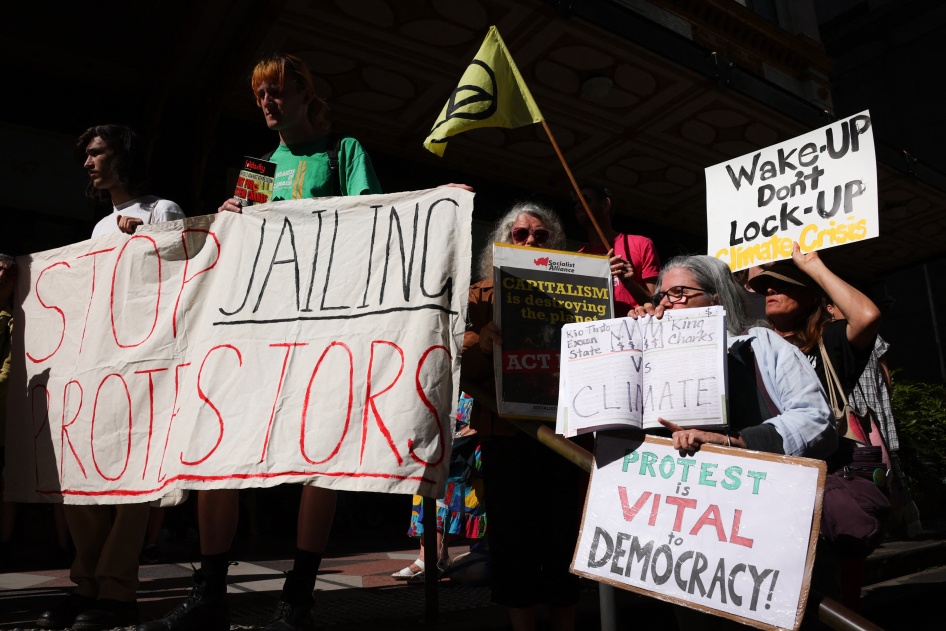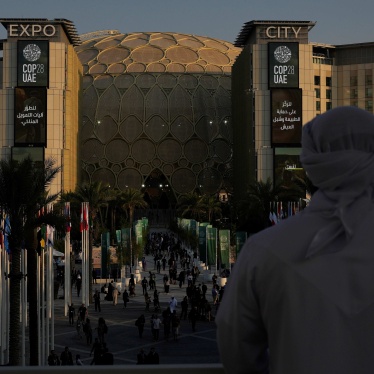(Bonn) – Governments attending UN climate talks in Bonn from June 3 to June 13, 2024, should push for rights-respecting and ambitious climate action, Human Rights Watch said today. The Bonn Climate Change conference will lay the groundwork for negotiations at the United Nations Climate Change Conference (COP29) from November 11 to November 22, 2024.
At COP28, governments agreed to transition away from fossil fuels. At the Bonn climate talks, they should follow through on this commitment by implementing a full phaseout of all fossil fuels in a just and time-bound manner at the national level. They should also use the Bonn climate talks to press Azerbaijan, the host for the upcoming COP29, to allow civil society to demand and scrutinize climate action before, during, and after the conference.
“Bonn will be a key moment for all governments to turn words into action on a full, fair and time-bound fossil fuel phase-out and meaningful civil society participation in climate negotiations,” said Myrto Tilianaki, senior environmental advocate at Human Rights Watch.
COP28’s key outcome document, the Global Stocktake, called on countries to start “transitioning away from fossil fuels” but fell short of committing governments to phase out all fossil fuels within a clear time frame. As countries prepare to submit their national climate plans with emissions reductions targets in 2025, they should ensure that they are consistent with limiting global warming to 1.5 degrees Celsius.
According to the Intergovernmental Panel on Climate Change, existing fossil fuel projects are already more than the climate can withstand to limit global warming. The International Energy Agency has also stated that there cannot be any new fossil fuel projects if countries are to avert the worst consequences of the climate crisis.
While Azerbaijan has recently invested in renewable energy, its oil and gas industry provides most of the government’s revenue. During a high-level meeting in April 2024 to prepare for COP29, President Ilham Aliyev claimed that the country’s oil and gas reserves were “a gift from God,” while announcing plans to expand gas production mainly to respond to EU market demands. The EU is a major importer of Azerbaijani gas and it signed a deal in 2022 to double gas imports from Azerbaijan by 2027.
During the same meeting, Aliyev claimed that Azerbaijan will “defend the right” of other fossil fuel-rich nations to “continue investments and production because the world needs it.” Other countries should not allow Azerbaijan to use its position as host to continue to push the expansion of fossil fuels and undermine efforts to confront the climate crisis and protect human rights, Human Rights Watch said.
Azerbaijani authorities have a longstanding record of severely curtailing freedom of expression and association, swiftly and often brutally dispersing peaceful protests, and paralyzing the ability of independent nongovernmental organizations to work with its restrictive laws and arbitrary denials of registration. A crackdown on independent voices over the past year has resulted in the arrest or sentencing of at least 25 independent journalists and civil society activists on a variety of bogus criminal charges. Almost all remain in pretrial custody.
Among those detained is a prominent human rights defender, Anar Mammadli, arrested on bogus “smuggling” charges on April 29. Mammadli is a member of the Network of Human Rights Houses and a founding member of the recently formed Climate of Justice Initiative. The group is a civil society undertaking that seeks to use COP29 to promote civic space and environmental justice in Azerbaijan.
In July 2023, the authorities arrested Gubad Ibadoghlu, an anti-corruption activist and revenue transparency expert who focuses on Azerbaijan’s fossil fuel sector. He was detained on bogus counterfeiting and extremism charges and his health severely deteriorated in prison. Under intense international pressure in April 2024 the authorities transferred him to house arrest pending an investigation.
The German government, host of the Bonn climate talks, set a dangerous precedent recently with the indictment of Letzte Generation (Last Generation), a climate activist group known for acts of civil disobedience, as a criminal organization. This reflects a troubling European trend of stifling civil society and climate activism at a time when people are increasingly calling for stronger global efforts to tackle climate change.
Such actions risk chilling public participation in protests against state policies that fall short of addressing the climate crisis, including during the Bonn climate conference. COP28 was marred with unprecedented restrictions on freedom of speech from the United Nations Framework Convention on Climate Change (UNFCCC) Secretariat within the UN-run “blue zone.” To live up to their human rights commitments, the hosts of the UN Framework Convention’s conferences, including Germany and Azerbaijan, as well as its Secretariat, should respect the human rights of all participants, including their right to speak freely and to peacefully assemble inside and outside the official conference venue.
“Azerbaijan’s crackdown on freedom of expression and peaceful assembly raises grave concerns about whether independent members of civil society, activists, human rights defenders, and journalists at COP29 will be able to participate meaningfully before, during and after the conference,” Tilianaki said. “Robust civil society participation is important to hold governments to account and ensure ambitious COP29 outcomes.”
For this and future climate negotiations, the UN agency should make host agreements public and accessible, while ensuring that they uphold international human rights law. The UN should set human rights criteria for the selection of future COP hosts, including respect for the rights to freedom of speech and peaceful assembly. The UN should also ensure that fossil fuel industry interests do not undermine the credibility and outcome of the negotiations.
One of the main issues to be discussed at the Bonn climate meeting will be the establishment of the new global climate finance goal that governments are expected to set at COP29, to support the needs of developing countries in their mitigation and adaptation efforts. As countries negotiate new finance goals, they should commit to ending all forms of support, including subsidies and international finance, for oil, gas, and coal developments to rapidly reduce emissions and to limit the impacts of climate change. At the same time, they should put in place adequate measures to ensure that any associated price increases do not undermine people’s economic, social, and cultural rights.
“Holding COP29 in Azerbaijan raises serious concerns about the possibility of advancing ambitious climate action in negotiations,” Tilianaki said. “Governments attending the Bonn preparatory meeting should call out Azerbaijan for its repression of civil society and make clear that they will actively confront any attempts to weaken robust climate policies.”






